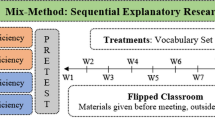Abstract
In this study, a Socratic Collaborative Inverted/Flipped teaching scenario was designed and tested for one semester. Undergraduate students (N = 12) attended a course on vocabulary teaching strategies and their perceptions to it were measured through a questionnaire created for this purpose, before and after the experimental treatment. Participants’ reactions to clarity of instructions and scenario were positive, suited to their English language level, and statistically correlated to orientation instructions usefulness before the implementation of the course.
Access this chapter
Tax calculation will be finalised at checkout
Purchases are for personal use only
Similar content being viewed by others
References
Anthony, E.D.: Approach, method, and technique. ELT J. XVII 2, 63–67 (1963)
Barkley, E.F., Cross, K.P., Major, C.H.: Collaborative Learning Techniques: a handbook for college faculty. Jossey-Bass (2005)
Böttger, H., Ypsilandis, G.S.: Opportune Change in Language Education: A Socratic Inverted/Flipped Teaching Proposal (2016)
Brown, D.H.: Principles of Language learNing & Teaching, 4th edn. Longman, New York (2000)
Donovan, M.S., Bransford, J.D.: How students Learn—Science in the Classroom. National Academy Press, Washington DC (2005)
Gunawardena, C.N., McIsaac, M.S.: Distance education. In: Jonassen, D.H. (ed.), Handbook of Research in Educational Communications and Technology, 2nd edn., pp. 355–395. Lawrence Erlbaum Associates, Mahwah (2004)
Holmberg, B.: The evolution, principles and practices of distance education. Open Learn. 21, 273–277 (2005)
Nouri, J.: The flipped classroom: for active, effective and increased learning – especially for low achievers. Int. J. Educ. Technol. High. Educ. 13(1), 1 (2016). https://doi.org/10.1186/s41239-016-0032-z
Odell, A.: Evaluating CALL software. In: Leech, G., Candlin, C. (eds) Computers in English Language Teaching and Research. Longman (1986)
Roehl, A., Reddy, S.L., Shannon, G.J.: The flipped classroom: an opportunity to engage millennial students through active learning. J. Fam. Consum. Sci. 105, 44–49 (2013)
Smith, J., Lee, V., Newmann, F.: Instruction and achievement in Chicago elementary schools. Improving Chicago’s Schools: Consortium on Chicago School Research (2001)
Vougioukli, S.: Helix hyperoperation in teaching research. Sci. Phil. 8(2), 157–163 (2020)
Vygotsky, L.S.: Mind in Society: The Development of Higher Psychological Processes. Harvard University Press, Cambridge (1978)
Ypsilandis, G.S.: Computer Assisted Language: A Communicative Attempt (1995)
Ypsilandis, G.S.: Feedback in distance education. C.A.L.L. J. 15(2), 167–181 (2002)
Acknowledgments
The author wishes to thank Prof. Penelope Kambaki-Vougioukli and Dr Panagiota Kotsoni for their contribution to this experiment.
Author information
Authors and Affiliations
Corresponding author
Editor information
Editors and Affiliations
Rights and permissions
Copyright information
© 2023 The Author(s), under exclusive license to Springer Nature Switzerland AG
About this paper
Cite this paper
Ypsilandis, G.S. (2023). Measuring Learners’ Stances to a Socratic Collaborative Flipped Teaching Approach. In: Auer, M.E., Pachatz, W., Rüütmann, T. (eds) Learning in the Age of Digital and Green Transition. ICL 2022. Lecture Notes in Networks and Systems, vol 633. Springer, Cham. https://doi.org/10.1007/978-3-031-26876-2_80
Download citation
DOI: https://doi.org/10.1007/978-3-031-26876-2_80
Published:
Publisher Name: Springer, Cham
Print ISBN: 978-3-031-26875-5
Online ISBN: 978-3-031-26876-2
eBook Packages: Intelligent Technologies and RoboticsIntelligent Technologies and Robotics (R0)




